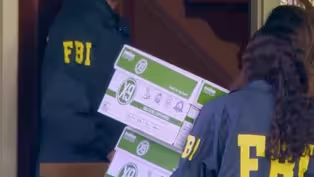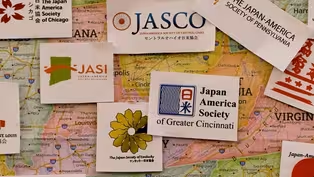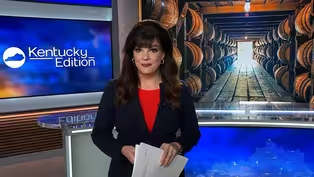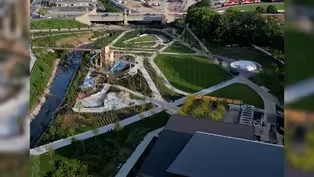
Previewing SOAR 2025
Clip: Season 4 Episode 40 | 5m 28sVideo has Closed Captions
It's the region's largest networking and economic development event.
Eastern Kentucky's largest networking and economic development event kicks off on Tuesday in Corbin. Shaping Our Appalachian Region, or SOAR, hosts the annual summit. Kentucky Edition sat down with SOAR's executive director for a preview of this year's event.
Problems playing video? | Closed Captioning Feedback
Problems playing video? | Closed Captioning Feedback
Kentucky Edition is a local public television program presented by KET

Previewing SOAR 2025
Clip: Season 4 Episode 40 | 5m 28sVideo has Closed Captions
Eastern Kentucky's largest networking and economic development event kicks off on Tuesday in Corbin. Shaping Our Appalachian Region, or SOAR, hosts the annual summit. Kentucky Edition sat down with SOAR's executive director for a preview of this year's event.
Problems playing video? | Closed Captioning Feedback
How to Watch Kentucky Edition
Kentucky Edition is available to stream on pbs.org and the free PBS App, available on iPhone, Apple TV, Android TV, Android smartphones, Amazon Fire TV, Amazon Fire Tablet, Roku, Samsung Smart TV, and Vizio.
Providing Support for PBS.org
Learn Moreabout PBS online sponsorshipEastern Kentucky's largest networking and economic development event.
The Soar summit kicks off next Tuesday in Corbin, shaping our Appalachian region or Soar hosting annual summit that's focused on finding ways to bring economic growth and innovation and opportunities to Eastern Kentucky.
This year's theme, A Gathering of the relentless.
We sat down with Saws Executive Director Colby Hall to learn what that means.
We feel like relentlessness or grittiness or toughness or perseverance is kind of embedded in the blood of Eastern Kentucky.
It's in the mountains.
It's the spirit.
And it's no different at this moment in time.
With as we look ahead and we'll talk about some of those things.
But as changes are going to come to the economy and new opportunities, you know, we're going to have to continue to bear down.
And, you know, think about what are those right decisions, what are the conversations?
But that at a baseline, right, this, this, this, the strong people that have fallen down but have gotten up time and time again and that have really hard, and the idea that we have to figure this stuff out ourselves.
Right.
There's no silver bullet.
There's nobody that's going to come in and do it for us.
Like we have to lead ourselves to the future where we want to go.
I mean, all of that comes into this idea of the theme and what it means to be from eastern Kentucky.
So that's a lot of like what went behind the theme this year.
We felt like it was very fitting when I say that we need to take control of our future, or we need to make sure that, hey, like, if the change we want to see, we have to be leading it.
I say that in a very collaborative way where we're doing the work, we know that like nobody's going to save us, but we're together, so we're taking in ideas.
We're having conversations, and we try to pay attention to what's going on and like what is relevant in this economic development, economic mobility, workforce development.
We really feel like our mission at Soar is, is, is based on the idea that, every eastern Kentucky should have access to the American dream, right?
That a zip code shouldn't predetermine somebodys economic potential.
Right.
And central to all that is a good paying job, a good paying job where somebody can support a family.
What communities can can expect a steady stream of tax revenue to be able to make investments in quality of life and so on and so forth.
So we we try to pay attention to what is going on, you know, what is being talked about, what's relevant for for rural areas.
We also try to think like be forward looking, right in terms of like where the conversation we need to have today to prepare for big shifts, big adjustments that are happening.
So, you know, that's probably why you see on the agenda this year.
You know, I obviously having a huge part of our of our content because everybody's talking about AI is everywhere.
And it's going so fast.
Very understandably, people are scared and asking questions as we should be.
And like, what's that mean for eastern?
What's it mean for for rural America?
Right.
Like, let's be real.
Like, you know, jobs are going to be lost.
There's this is another kind of one of those inflection points in the American economy, the stuff that comes with free market capitalism.
Let's try to like be early with like, what's the data showing?
Like what career seem to be really being augmented.
How do we try to adjust our education and training systems to not be reactive?
And then also like there's a, there's a bigger conversation there where they have like, what's it mean to be human?
Like, what do we want as a, as communities, right.
Like the role that work has played.
And if that alters like so we're trying to like be ahead of that so that we start talking about those things because we don't want to be caught when all of it happens.
And being in a position of being reactive, I think about how much the world's changed in 11 years.
But I think the consistent conversations, around that, I think the innovation track like business, the business ideas, the businesses that have started, the startups that have started, the funding that has been received, a lot of that comes when you take somebody with an idea and they meet people in the ecosystem with resources or mentors.
They get connected and they're able to build from there.
I think there's a ton of great success stories that we could pull in the entrepreneurship space of, of of people that, that get there.
I think students, I think when you go and you look at high schools that have been and we we talk to people that they first came to the summit as a high school or they came back as a college student.
Now they're in a new position with a company, and they're still back and all these different seasons of their life, and they just the summit and this event and really what it stands for, right?
This idea that Eastern Kentucky is worth fighting for and that we are a smart, capable region, that we want people to take notice, like we want people to notice that and recognize that.
And we have to make sure our voice is heard like that.
It's really cool to see when that's clearly had an impact on somebody's life, and that they made a decision to stay not because of the summit, but that the summit reminded them that we were in a special, a special place.
Coming up Monday, we have more from our interview with Colby Hall as he shares how the summit is inspiring change in rural areas outside Kentucky.
And for more on the summit, including information on speakers and sessions, go to saw K. We talk.
Congressman Comer on FBI Raid of John Bolton's Home
Video has Closed Captions
Clip: S4 Ep40 | 1m 11s | The former national security adviser was fired during President Trump's first term. (1m 11s)
Kentucky Conference Building U.S.-Japan Connections
Video has Closed Captions
Clip: S4 Ep40 | 3m 29s | How a conference in Lexington is helping build relationships between Japan and the United States. (3m 29s)
Kentucky's Bourbon Industry Reacts to Latest Tariff News
Video has Closed Captions
Clip: S4 Ep40 | 46s | Canada is dropping retaliatory tariffs against the U.S.; good news for Kentucky's bourbon industry. (46s)
Opening of Lexington's Gatton Park Ten Years in the Making
Video has Closed Captions
Clip: S4 Ep40 | 2m 33s | The ten-acre park features an amphitheater, splash pad, playground, dog park and more. (2m 33s)
Providing Support for PBS.org
Learn Moreabout PBS online sponsorship
- News and Public Affairs

Top journalists deliver compelling original analysis of the hour's headlines.

- News and Public Affairs

FRONTLINE is investigative journalism that questions, explains and changes our world.












Support for PBS provided by:
Kentucky Edition is a local public television program presented by KET



